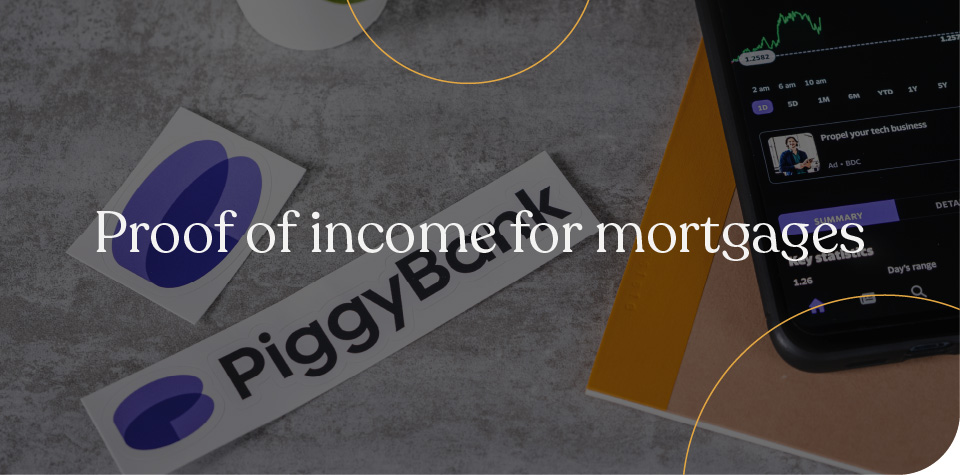
What proof of income do you need when getting a mortgage in the UK?
Before mortgage lenders lend you money to purchase a home, they will carry out their lender criteria checks to verify your income and ability to repay the mortgage.
A written monthly or annual salary statement is insufficient to prove your income. You must submit various supporting documents such as bank statements and credit history checks.
This guide will explain the various types of income you can declare, how to prove it to mortgage lenders and what documents to prepare for a mortgage application.
Always be prepared to have your bank account statements to hand. Mortgage providers lending will decide how much they can lend you based on your financial situation. They will also want to know what your approximate annual income is.
When you click the below link, a mortgage broker will provide mortgage advice, help with your mortgage application and introduce you to the best mortgage provider for your income band.
Get started online
How do I prove my earnings to get a mortgage?
Different mortgage lenders will require different income proofs to qualify for mortgage applications.
These are the most common ways to prove earned income for the mortgage lender to access:
- Payslips – The minimum requirements are three months of payslips and two years’ P60s. However, some mortgage lenders will accept lower amounts.
- Contract – While not all lenders will require a copy of your contract, if payslips can be provided, specialist lenders may ask for a signed employment contract if you are interested in getting a mortgage with a new job.
- Accounts for self-employed: Most Self-employed borrowers don’t have payslips that can prove all their income.
- Director mortgage applications The applicant must usually have a PAYE amount to cover their tax-free allowance or NI contributions. Most lenders will require proof of income.
- SA302 or Tax Year Overview (taken from HMRC Website).
- Company accounts signed in full
- Reference of an accountant (qualified, signed off to confirm income).
- Bank statements. Most mortgage lenders want to see the net income on payslips/earnings from self-employment for the past three months. Though they don’t request it, advisors must still have this information on file for future reference.
What income are you allowed to use for a mortgage?
You may not need to provide proof of your salary to get a mortgage if you don’t have a job, however, other income sources could also be considered and should be provided.
Documenting bonus income in support of a mortgage application
A few borrowers may receive monthly or annual bonuses, which could be considered qualifying income for a mortgage.
Lenders have different approaches to bonuses and other forms of extra income, such as overtime and commission, while some lenders will accept bonuses, others won’t.
Many lenders will accept half of the bonus, but not all lenders will consider it. In contrast, a few lenders will accept 50% of the bonus, while others may be more generous and offer you a mortgage that is based on your regular bonuses and your basic income.
Are benefits considered for a mortgage application?
Most lenders will consider certain types of benefits when assessing income.
Although the benefits accepted can vary, some lenders will accept them and allow borrowers to use these to supplement their mortgage applications.
- Credit for child tax
- Credit for working tax
- Child benefit
- Disability Living Allowance (DLA).
- Industrial Injuries Benefit (IIB).
- Incapacity benefit (IB).
- Attendance Allowance
- Pension Credit
- Maternity Allowance
- Severe Disablement Allowance
- Widow’s pension
- Carer’s allowance
Click the link below to speak with a specialist mortgage broker with free advice:
Get started online
Mortgage applications require evidence of benefit income
Lenders may require a court order to prove child maintenance or other benefits if it is being considered. There would be some things you can consider, even if a court order did not make the payment.
As long as the payments are received and shown in full in the corresponding bank account, it is likely that the payments will be reliable and sustainable in the future.
Mortgage applications require documentation of income from benefits
If benefits are to be considered, they must be shown as regular payments on bank statements and the complete schedule of payments from the authority paying.
If a benefit is meant-tested, it must show that the calculation was done correctly and in accordance with the applicant’s earnings.
Let’s say, for example, that an applicant receives child tax credit, and their “earned income” is £10k per year. This will be used to assess the applicant.
The applicant applies with a £20k per year income and could signify mortgage fraud or that the income was not received recently.
The benefit income could be recalculated or reduced if the income has not been received in a while. The applicant cannot use the income to supplement the income until the current payment schedule is available.
For those who are employed, proof of income:
- Payslips – Most lenders require the last three months’ payslips and two to three years of P60s.
- If your payslips do not list it, you must provide evidence of any bonuses or overtime.
- Signed employment contract – Lenders may ask for a signed contract if you have recently started or are due to start a new position.
For self-employed applicants, proof of income for self-employed mortgages.
- Certified accounts must be certified for at least one year. Often, it can take two to three years.
- HMRC tax calculations, SA302 forms and tax year overview for the two or three previous financial years.
- Contractors: Signed copies of all upcoming contracts.
- Sometimes, an accountant’s certificate may be required.
Unemployed applicants will need to provide proof of income
- The relevant benefit office will require proof of benefits.
All applicants must provide proof of income.
- Bank statements – Most lenders will require bank statements for the past three months (sometimes more) to cross-reference your income and earnings with the bank account.
What types of income are considered for a mortgage loan?
Many people will claim that a PAYE (pay-as-you-earn) salary is their primary or sole source of income.
This allows them to apply for mortgages more quickly. There are many other types of income that can be declared.
Below is a list of some other income sources lenders will accept.
It also shows how much weight they are likely to have (i.e. which percentage will be taken into consideration when you apply for a mortgage)
Type of income
Percentage (%) income considered
Basic salary for employment
Usually, 100%
Bonuses/commissions/overtime/shift allowance
0 – 100%
Self-employment: Net profit/salary & dividends drawing
Usually, 100%
Bursary/grant / stipend
0 – 100%
Pension income (pension).
Usually, 100%
Benefit income
0 – 100%
International income
0 – 100%
Whether you are a lodger or a landlord, rental income is possible
0 – 100%
Get started online
How do I prove my income as a contractor?
Lenders looking to verify earnings for a mortgage might ask for a copy of your work contract. This will show how much you earn. It will also depend on the type of work you do.
Certain professions can provide continuous employment because they rely heavily on contracts. Some may only hire contract workers for short periods. Lenders may be concerned that you will lose your job in weeks and could consider you too risky.
Lenders want to see evidence of income from contractors to approve a mortgage. They also require a more extended work history and proof that the income is reliable and sustainable.
This is done by requiring the minimum income to be maintained for at least two years.
However, some specialists will consider 12 months. A few specialists will also consider contractors who have worked less than this in certain circumstances.
The contract is the most common evidence needed to verify the details of the contract, such as when it was signed, when it was set to expire, and the terms for payment. The evidence required is often the contract itself to verify that money was paid.
I’m self-employed. What can I do to prove my income?
You can show proof of your income as a self-employed individual in several ways, including:
- Payslips, P60s, employer references
- Statements on benefits and pension
- Self-employed accounts – SA302 tax returns
Lenders, especially those with more significant credit histories, will require evidence that your accounts date back at least three years. Some lenders will accept your accounts back to the last year if you have been self-employed for less than one year.
I am the owner of a business. What is the best way to prove my income?
It can be more difficult if you own a limited company. When assessing affordability, some lenders only consider the salary you receive from the company, others will take into account any dividends or profits.
Evidencing income for a mortgage if an umbrella company pays you
Contractors may choose to work for an umbrella company to save the hassle of managing payroll, paying late invoices, and dealing with tax authorities.
This arrangement has many benefits. Most importantly, your umbrella company can provide a traditional history of your earnings to a lender. Contractors who have their accounts may not be able to provide proof of income until the end of a tax year.
However, umbrella workers can do this. Employees of umbrella companies receive regular remittance slips (weekly or monthly), which lenders may accept as income evidence if there are no traditional wage slips.
It is important to remember that an umbrella company will require a specialist mortgage provider.
While some lenders may not be willing to lend you a mortgage based solely on your income, forgetting to account for bonuses and commissions, specific lenders offer umbrella mortgages and products specifically geared towards people who work through an umbrella organisation.
Get started onlineCan I get a mortgage if I don’t have proof of income?
It was possible for a time to obtain a mortgage without proof of income in the UK.
These mortgages were also known as self-certification mortgages, which were eventually banned due to the credit crunch in 2008.
It is possible to get still a self-certified buy-to-let mortgage from only a few lenders in the UK.
How can I prove my income to get a mortgage for a buy-to-let property?
If you are applying for a mortgage, most UK lenders will require you to have a minimum amount of income (£25,000 is the standard minimum requirement). They will typically ask you for proof of income in the same manner as you would for a residential contract.
Lenders may offer a buy-to-let mortgage without proof of income if the borrower can prove that they have other sources of capital. You may need to provide evidence of funds entering your account or that they are on the way.
If you are a professional landlord whose income is solely for your property portfolio, it may be possible to get a buy-to-let mortgage without PAYE.
You may need to provide income verification documents for your mortgage application, such as accounts of your properties and a self-assessment return tax return.
Talk to an expert about income-proofing mortgages.
If you are looking for mortgage approval, you are in the right place here at Loan Corp.
Our mortgage brokers are regulated by the FCA and will introduce you to a mortgage lender tailored to you.
We will ensure you are offered the best mortgage deal on the market and will guide you through the mortgage application.
Begin your journey by clicking the link below:
Get started online
